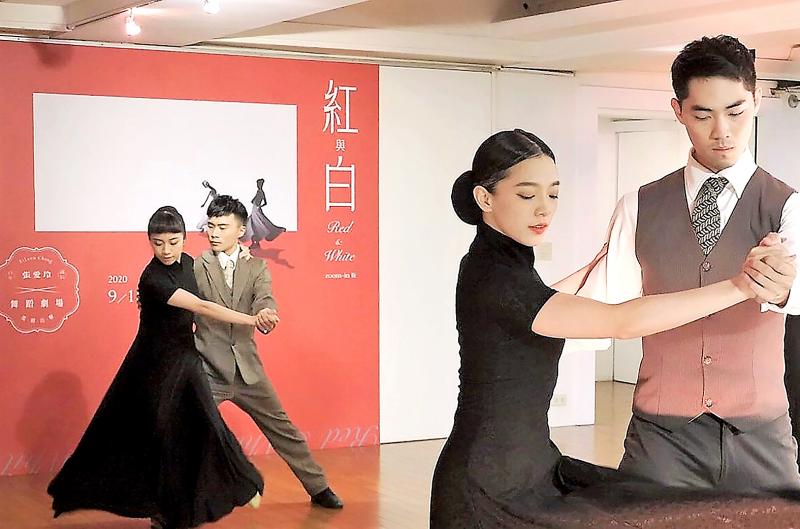To mark Eileen Chang’s (張愛玲) 100th birthday tomorrow, Crown Publishing and other publishing houses are offering special editions of Chang’s collected works, and other writings celebrating the life and legacy of the acclaimed author.
Crown, which has published all of Chang’s works, is printing a limited-edition commemorative anthology, while Linking Publishing, Unitas Publishing, China Times Publishing and others are also producing special editions to celebrate the milestone.
Crown in January started planning the anthology series, which is to run until October next year, featuring redesigned covers with Chang’s own illustrations and handwriting.

Photo courtesy of Dance Forum Taipei
The company this month is also for the first time printing a collection of Chang’s private correspondence with friends from 1955 to 1995.
The letters pull back the curtain on Chang’s creative process behind Lust, Caution (色,戒) and Little Reunions (小團圓), offering researchers a valuable first-hand resource, the firm said.
Unitas is publishing another collection of letters with its centenary edition of literary critic Hsia Chih-tsing’s (夏志清) Eileen Chang’s Letters to Me (張愛玲給我的信件), a collection of more than 30 years of correspondence between the two.
In the volume, Hsia has organized the letters by date and location, and added notes to explain the circumstances behind each entry, providing an invaluable record for understanding the author, Unitas said.
Meanwhile, China Times Publishing is providing two offerings in the field of “Chang studies” with academic Chang Hsiao-hung’s (張小虹) books Textualizing Eileen Chang (文本張愛玲) and The Wigs of Eileen Chang (張愛玲的假髮).
The former deconstructs Eileen Chang’s original name and life story, and in this light offers close readings of her works, while the latter opens up a new direction in the field by using “addendum” literary theory to discuss the author’s will, legacy and items she left behind.
Comprised of a collection of essays by contemporary academics, Linking Publishing’s Lust, Caution: From Eileen Chang to Ang Lee (色,戒:從張愛玲到李安) explores filmmaker Ang Lee’s (李安) fondness for Eileen Chang’s 30-page short story and his process of adapting it for the screen.
Eileen Chang was born in Shanghai on Sept. 30, 1920, to a prominent family with ties to the highest echelons of the Qing government.
Originally named Chang Ying (張煐), her mother changed her given name to better match her English name before entering her into the prestigious bilingual Saint Mary’s Hall in Shanghai.
Her cross-cultural education continued with a stint at the University of Hong Kong studying English literature, although she was forced to leave one semester early after Japan took control of the territory.
It was during the Japanese occupation of Shanghai in 1943 and 1944 that she produced some of her best-known works, including Love in a Fallen City (傾城之戀) and The Golden Cangue (金鎖記).
Her life reads like a history of modern China itself, with circumstances bouncing her between Tianjin, Shanghai, Hong Kong and the US, before finally settling in Los Angeles, where she died in 1995.
Eileen Chang did not limit herself to any literary format, writing novels, prose, screenplays and even translations across her illustrious career that still maintains an outsized influence on today’s Chinese-language literary circles.

Eight restaurants in Taiwan yesterday secured a one-star rating from the Michelin Guide Taiwan for the first time, while three one-star restaurants from last year’s edition were promoted to two stars. Forty-three restaurants were awarded one star this year, including 34 in Taipei, five in Taichung and four in Kaohsiung. Hosu (好嶼), Chuan Ya (川雅), Sushi Kajin (鮨嘉仁), aMaze (心宴), La Vie by Thomas Buhner, Yuan Yi (元一) and Frassi in Taipei and Front House (方蒔) in Kaohsiung received a one-star rating for the first time. Hosu is known for innovative Taiwanese dishes, while Chuan Ya serves Sichuan cuisine and aMaze specializes

Taitung County is to launch charter flights to Malaysia at the end of this year, after setting up flights to Vietnam and Thailand, the Taitung County Government said yesterday. The new charter flight services, provided by low-cost carrier Batik Air Malaysia, would be part of five-day tour packages for visits to Taitung County or Malaysia. The Batik Air charter flight, with about 200 seats, would take Malaysian tourists to Taitung on Dec. 30 and then at 12:35pm return to Kuala Lumpur with Taiwanese tourists. Another charter flight would bring the Taiwanese home on Jan. 3 next year, arriving at 5:30pm, before taking the

Taiwan High Speed Rail Corp. (THSRC) plans to ease strained capacity during peak hours by introducing new fare rules restricting passengers traveling without reserved seats in 2026, company Chairman Shih Che (史哲) said Wednesday. THSRC needs to tackle its capacity issue because there have been several occasions where passengers holding tickets with reserved seats did not make it onto their train in stations packed with individuals traveling without a reserved seat, Shih told reporters in a joint interview in Taipei. Non-reserved seats allow travelers maximum flexibility, but it has led to issues relating to quality of service and safety concerns, especially during

An exhibition celebrating Taiwan and Japan’s comic culture opened on Saturday in Taichung, featuring a section that explores Taiwanese reproductions of Japanese comics from when martial law limited Japanese representation. “A Century of Manga Culture: An Encounter of Taiwan and Japan’s Youth” held its Taiwan opening ceremony at Taichung’s National Taiwan Museum of Comics after an initial one-month run in Japan’s Kyoto International Manga Museum between May 24 and June 24. Much like the Kyoto exhibition, the show mainly celebrates the comic connection between Taiwan and Japan through late Taiwanese comic book